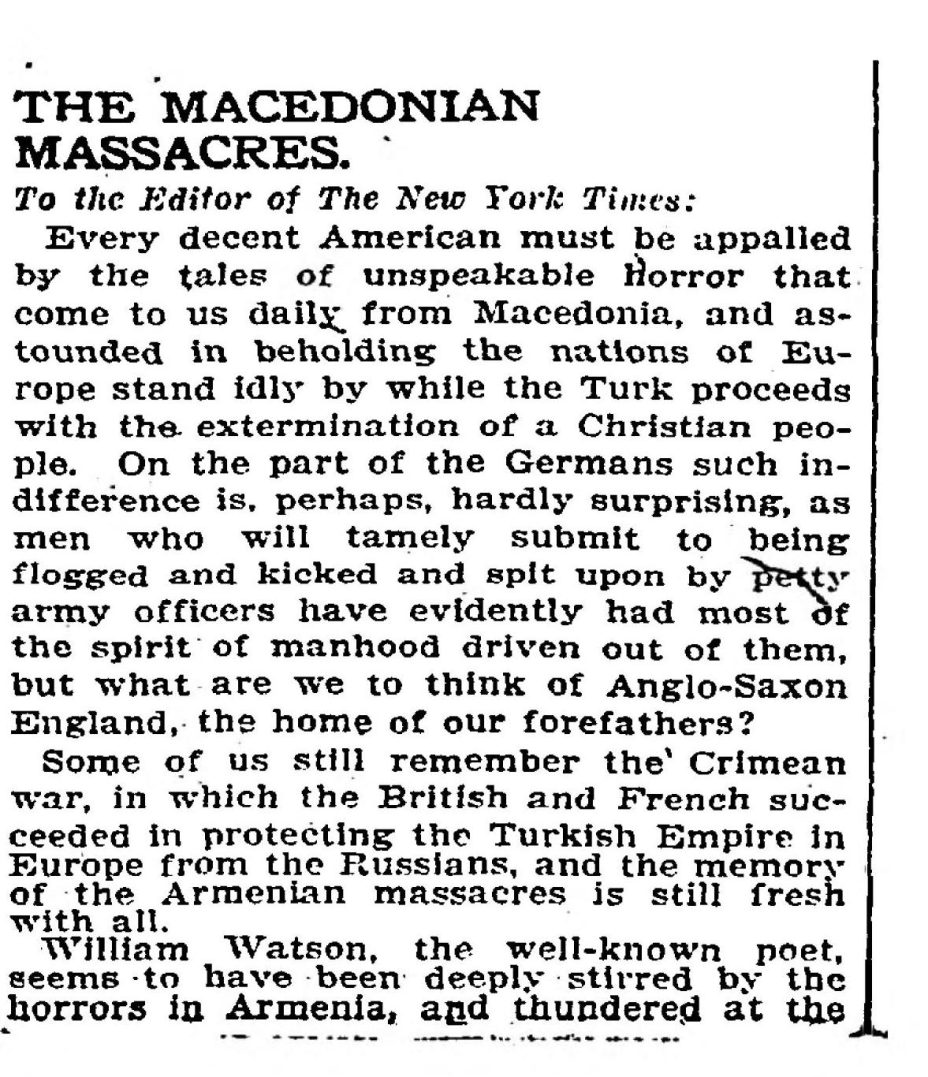


Краток опис на содржината:
МАКЕДОНСКИ КОЛЕЖИ
Од писмата до уредникот на Њу Јорк Тајмс
Во писмото се повикува на совесност во однос на злосторствата кои се случувале во Македонија после Илинденското Востание. Така пишува „секој чесен Американец мора да е стаписан од сториите од неискажлив ужас кои дневно ни пристигнуваат од Македонија и исто така вџашен од недејственото стоење од страна на европските нации додека Турците продолжуваат со истребување на христијаните“. Во однос на Германците можеби и не е толку силно изненадувачки, но што да мислиме за англо-саксонска Англија од каде што потекнуваат нашите предци.
Се присеќава на Кримската војна каде што Англија и Франција ги заштитиле турските интереси во Европа од царска Русија.
Во продолжение се потсетува на ерменскиот холокауст, како и поетот Вилијам Вотсон кој по тој трагичен повод напишал поема.
„… weakness and apathy of his fellow-country-
men with a vigor that Is said to have cost
him the Laureateahip. ʌ collection of the
poems written by him at that time has
been published under the name of “ The
Year of Shame,” and I venture to quote
the following as peculiarly apposite to the
present situation:
THE /TURK IN ARMENIA.
What profits it, O England, to prevail
In arts and arms, and mighty realms subdue,
ʌnd ocean with thine argosies bestrew.
And wrest thy tribute from each golden gale.
If Idly thou must’ heafk-n to the wall
Of women martyred by the turban?d cre£v.
Whose tenderest mercy was the sword that slew.
And hazard not the dinting of thj* mail?
We deemed of old thou held’st a charge from
Him
Who sits companioned by His seraphim,
To smite the wronger with thy destined rod.
Wait* st thou His sign? Enough, the unan-
swered cry
Of virgin souls for vengeance, and on high
Ths gathering blackness of the frown of God!
Ignoble Ease!
Never henceforth. O England, nevermore
Prate thou of generous effort, righteous aim.
Whose shame ds that thou knowest not thy
shame!
Summer hath passed, and Autumn’s threshing
floor
B*en winnowed; Winter at Armenia’s door
Snarls like a wolf; and still the sword and
flame
Sleep not; thou only sleepest; and the same
Cry unto heaven ascends as heretofore;
And the red stream thou might’st have stanched
yet runs:
And roused by no divinely beckoning wraith,
Stirred by no clarion blowing loud and wide,
Eost in Ignoble ease, behold thy sons,
Sitting among the shards of^broksn faith,
And by the ruins of forgotten pride.
New York, Sept. 11. 1003. W. H. W.
THE MACEDONIAN
MASSACRES.
To the Editor of The New York Tiniest
Every decent American must be appalled
by the tales of unspeakable ɪ)orror that
come to us daily^ from Macedonia, and as-
tounded in beholding the nations of Eu-
rope stand idly by while the Turk proceeds
with the- extermination of a Christian peo-
ple. On the part of the Germans such in-
difference is, perhaps, hardly surprising, as
men who will tamely submit to being;
flogged and kicked and spit upon by “{I&tXy
army officers have evidently had most of
the spirit of manhood driven out of them,
but what are we to think of Anglo-Saxon
England, the home of our forefathers?
Some of us still remember the’ Crimean
war, in which the British and French suc-
ceeded in protecting the Turkish Empire in
Europe from the Russians, and the memory
of the Armenian massacres is still fresh
with all.
William Watson, the well-known poet,
seems to have been deeply stirred by the
horrors in Armenia, aɪɪd thundered at the
Published: September 13, 1903
Copyright © The New York Times …“

